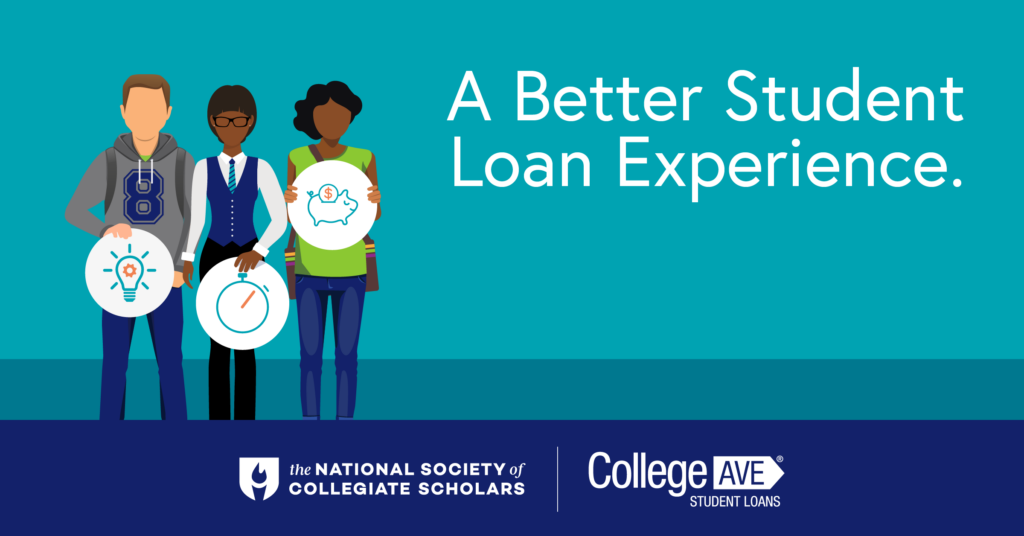The following article was provided by NSCS Partner College Ave Student Loans
The decision to go to graduate school is not one that should be taken lightly. It is, after all, a major decision, and you’ll have to weigh both the pros and cons of pursuing a graduate degree.
You’ll want to consider what goals you’re looking to pursue with a graduate degree and what schools you want to apply to. But a lot of the advantages and disadvantages you’ll need to consider often boil down to finances.
Some financial considerations of getting a graduate degree include the following:
- Tuition costs.
It’s no surprise that the cost of a graduate degree can be high – often much higher than the cost of pursuing an undergrad degree. According to TheBestSchools.org, the average cost of a graduate degree ranges from $30,000 to $120,000. This consideration alone can be enough for many potential applicants to change their mind.
Although graduate school can undeniably offer personal enrichment and more knowledge in a field, you’re already passionate about, it’s debatable whether you’ll earn a higher salary that eventually cancels out the cost of graduate school. Even for promising career fields, this is always a wager and sometimes can be impossible to predict.
- Your career.
If you’ve just graduated from college, you may be mulling over two options: establishing and growing your career or attending grad school. Some will tackle both, which can be feasible, but many choose to completely concentrate on one versus the other.
If you decide to delay getting a job and pursue a graduate degree, then it means you’re putting off earning a salary and gaining valuable job experience. Essentially, you are putting your career on hold, so ask yourself if this is something you can afford to do. If you are pursuing a graduate degree many years after you’ve established a career, your situation may be a little different – but it could also mean taking some time off from work to fit grad school into your schedule.
In some cases, grad school may very well be the next necessary step in your desired industry. Depending on what you want to do, it may be difficult (or impossible) to begin working with a four-year degree. For already-established professionals, a graduate degree can be the key to taking the next step up.
- More job opportunities.
Maybe you just graduated with your four-year degree and you have a clear picture in your head of the career you want. Or, maybe you’re still not sure – and that’s totally fine. Either way, graduate degrees can mean more job opportunities. Data from the U.S. Census Bureau shows that only about 12 percent of respondents over the age of 25 had a master’s degree or above, and joining that group can help your chances of standing out in a very competitive job market.
- Potential for a larger salary.
There are so many different variables that are part of an annual salary – the candidate’s experience, the job title, the industry standard for that job title, and so on. One part of the equation, of course, is your qualifications. A graduate degree may not necessarily get you a higher salary at a job that doesn’t require this level of education (although it certainly could), but for higher-paying careers that do require a graduate degree, this is easily one of the biggest financial benefits of pursuing a graduate degree. Learn more about the top five highest paying graduate school degrees.
- Time considerations.
You’ve probably heard it often: time is money. And if you ask any grad school student, they’ll likely tell you that pursuing a professional degree is very time-consuming; it can take approximately two years to finish a master’s degree. It can take away from your personal life, cause a lot of stress if you’re overworked with a packed schedule, and even affect your sleeping schedule. With that being said, explore the different options available to you for pursuing your professional degree. These days, many programs accommodate busy individuals that may not be able to attend class full-time. Some programs offer flexible part-time options; some programs offer part-time or full-time online options. Your time is valuable, so be sure to find a program with a schedule that fits your needs.
- Options for paying.
Just like when you pursued your undergrad degree, you’ll want to explore all the different options available to you for taking care of your grad school tuition. A lot of the same options will also be available when you attend grad school – for example, you may qualify for financial aid and/or scholarships, which can partially or fully fund your education. If Federal Direct loans, savings, and scholarships don’t cover the full cost, private student loans (like the ones our partner College Ave Student Loans) could be the answer for you.
To learn more about our private student loan program, click here.



